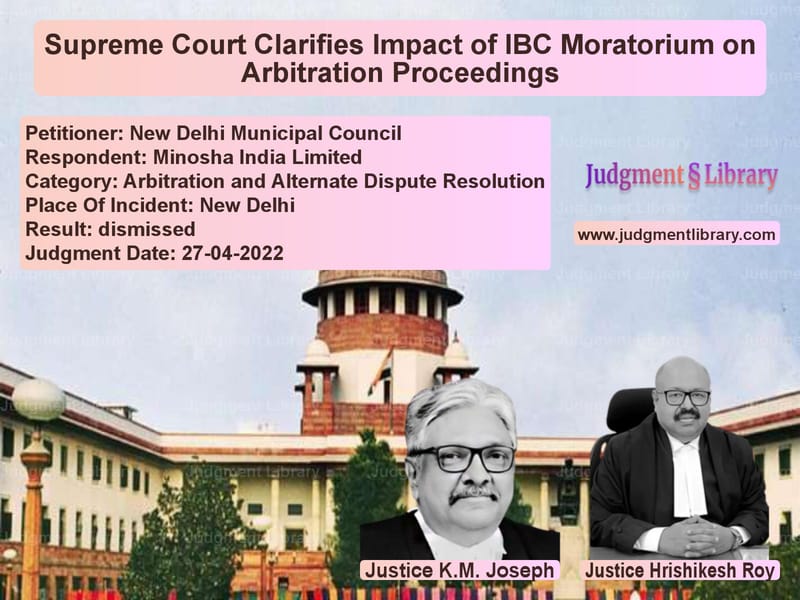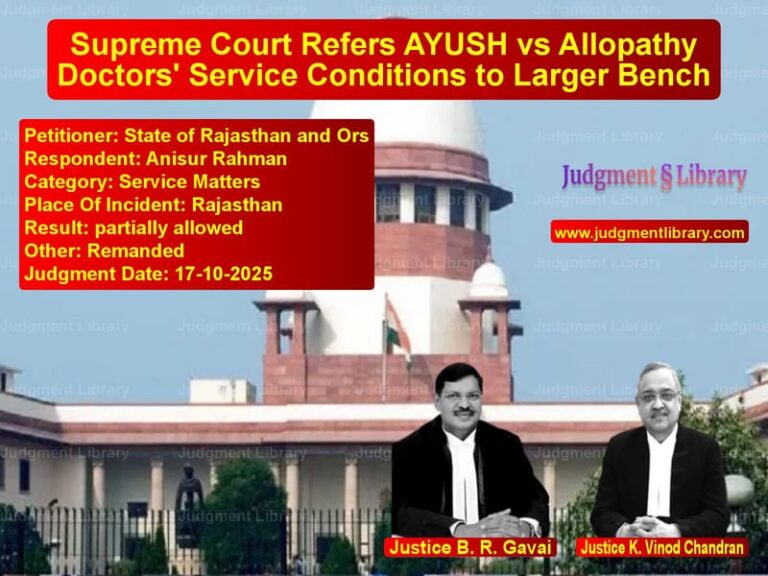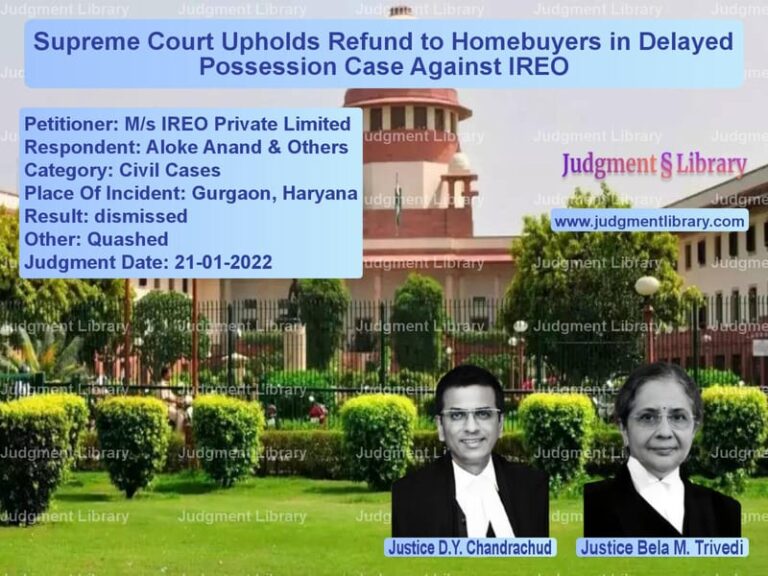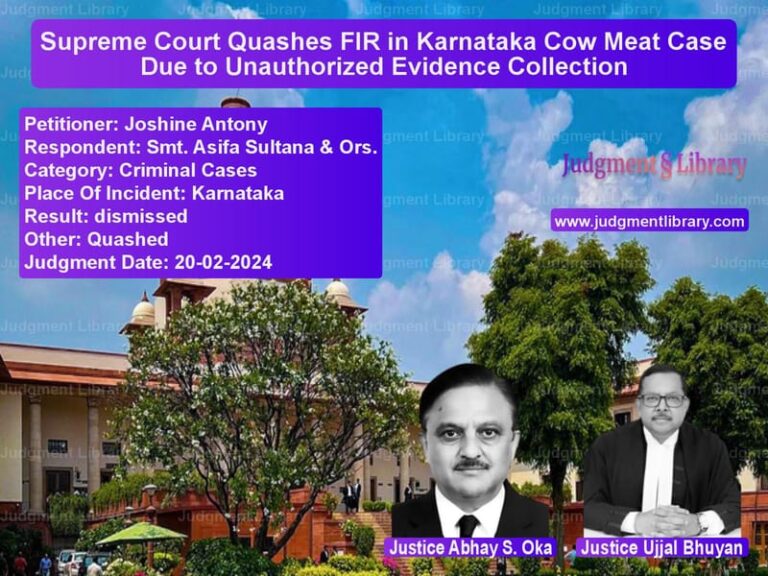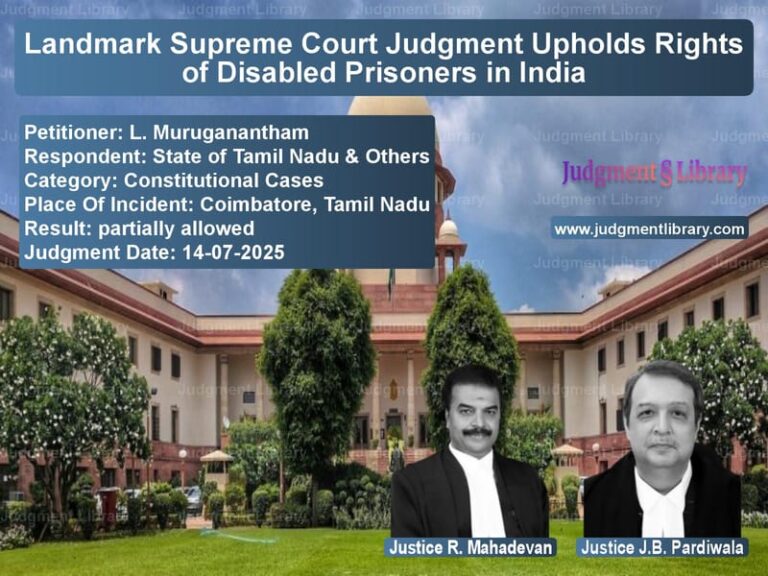Supreme Court Clarifies Impact of IBC Moratorium on Arbitration Proceedings
The case of New Delhi Municipal Council vs. Minosha India Limited revolved around a key legal question regarding the effect of Section 60(6) of the Insolvency and Bankruptcy Code (IBC) on arbitration proceedings initiated by a corporate debtor. The Supreme Court had to determine whether the period of moratorium under Section 14 of the IBC should be excluded while computing the limitation period for filing an arbitration application under Section 11(6) of the Arbitration and Conciliation Act, 1996.
Background of the Case
The dispute arose from a purchase agreement between New Delhi Municipal Council (NDMC) and Minosha India Limited. The appellant, NDMC, placed a purchase order worth ₹16.2 crore with Minosha. However, citing non-performance, NDMC terminated the contract. Minosha then invoked arbitration but faced delays due to ongoing insolvency proceedings.
Key developments in the case:
- 2015: NDMC placed a purchase order worth ₹16.2 crore with Minosha.
- May 17, 2016: NDMC rejected Minosha’s representation against the termination.
- June 7, 2016: Minosha invoked the arbitration clause.
- July 20, 2016: NDMC proposed arbitration through the Delhi International Arbitration Centre (DIAC).
- May 14, 2018: The National Company Law Tribunal (NCLT) Mumbai admitted an insolvency application against Minosha, imposing a moratorium.
- November 28, 2019: NCLT approved the resolution plan.
- November 25, 2020: Minosha filed an application under Section 11(6) of the Arbitration Act, seeking appointment of an arbitrator.
- December 14, 2020: The Delhi High Court allowed the application and appointed a sole arbitrator.
- April 27, 2022: The Supreme Court dismissed NDMC’s appeal, ruling that the limitation period was extended due to the IBC moratorium.
Petitioners’ Arguments
The appellant, NDMC, through its counsel Gourab Banerjee, argued:
“The arbitration application under Section 11(6) was filed beyond the limitation period. Even though Minosha was under insolvency resolution, Section 60(6) of the IBC should not apply since the corporate debtor was never barred from initiating proceedings.”
Key points raised:
- Section 60(6) of the IBC does not automatically extend limitation for arbitration applications filed by corporate debtors.
- The IBC moratorium applies to proceedings against corporate debtors, not those initiated by them.
- The resolution professional had full authority to initiate arbitration during the insolvency resolution period.
- The claim was already time-barred before the insolvency proceedings commenced.
Respondents’ Arguments
The respondent, Minosha India Limited, represented by Neeraj Kishan Kaul, countered:
“The moratorium period under the IBC must be excluded while calculating the limitation period for any proceedings by or against the corporate debtor, as explicitly provided in Section 60(6).”
Key counterarguments:
- IBC aims to protect corporate debtors and enable their revival by suspending all legal proceedings.
- The law clearly states that the limitation period is extended for both proceedings initiated by and against the corporate debtor.
- The arbitration application was filed within time once the moratorium period was excluded.
- NDMC had actively participated in discussions regarding arbitration, indicating that the dispute was still ongoing.
Supreme Court’s Observations
The Supreme Court bench, comprising Justices K.M. Joseph and Hrishikesh Roy, upheld the Delhi High Court’s decision, ruling that Section 60(6) of the IBC extends the limitation period for arbitration applications initiated by corporate debtors.
The Court stated:
“Section 60(6) explicitly provides that the limitation period shall be excluded for any suit or application by or against a corporate debtor for which a moratorium has been imposed. The object of this provision is to ensure that corporate debtors are not prejudiced due to their inability to initiate proceedings during insolvency resolution.”
Key findings:
- The moratorium period must be excluded while computing the limitation period for arbitration applications under Section 11(6).
- The law applies to both claims filed by and against the corporate debtor.
- The corporate debtor’s resolution professional could not be expected to initiate every possible legal proceeding during insolvency.
- The delay was justified given the restrictions imposed during insolvency resolution.
Legal Precedents Considered
The Supreme Court referred to various landmark rulings:
- B.K. Educational Services Pvt. Ltd. vs. Parag Gupta & Associates (2018): Held that the limitation period for filing claims is extended under IBC.
- Gaurav Dhir vs. Oriental Bank of Commerce (2021): Stated that the moratorium period must be excluded when computing limitation.
- State of Maharashtra vs. M/s. Atlanta Ltd. (2014): Emphasized the importance of granting corporate debtors a fair chance to resolve disputes.
Final Ruling
The Supreme Court dismissed NDMC’s appeal and ruled:
- The Delhi High Court’s appointment of an arbitrator was valid.
- Section 60(6) of the IBC extended the limitation period for Minosha’s arbitration application.
- The arbitration proceedings shall continue before the appointed arbitrator.
Conclusion
This ruling clarifies that the IBC moratorium applies to both claims filed by and against corporate debtors. The judgment ensures that financially distressed companies are not deprived of their legal rights during insolvency resolution, setting an important precedent for arbitration proceedings involving corporate debtors.
Petitioner Name: New Delhi Municipal Council.Respondent Name: Minosha India Limited.Judgment By: Justice K.M. Joseph, Justice Hrishikesh Roy.Place Of Incident: New Delhi.Judgment Date: 27-04-2022.
Don’t miss out on the full details! Download the complete judgment in PDF format below and gain valuable insights instantly!
Download Judgment: new-delhi-municipal-vs-minosha-india-limite-supreme-court-of-india-judgment-dated-27-04-2022.pdf
Directly Download Judgment: Directly download this Judgment
See all petitions in Arbitration Act
See all petitions in Dispute Resolution Mechanisms
See all petitions in Institutional Arbitration
See all petitions in Judgment by K.M. Joseph
See all petitions in Judgment by Hrishikesh Roy
See all petitions in dismissed
See all petitions in supreme court of India judgments April 2022
See all petitions in 2022 judgments
See all posts in Arbitration and Alternate Dispute Resolution Category
See all allowed petitions in Arbitration and Alternate Dispute Resolution Category
See all Dismissed petitions in Arbitration and Alternate Dispute Resolution Category
See all partially allowed petitions in Arbitration and Alternate Dispute Resolution Category

